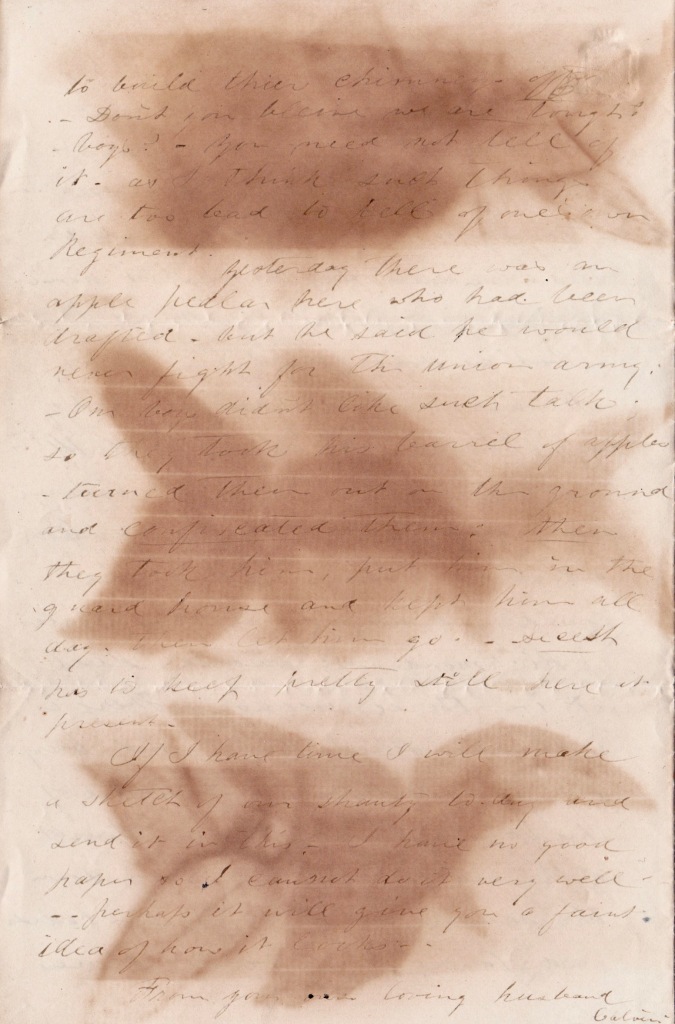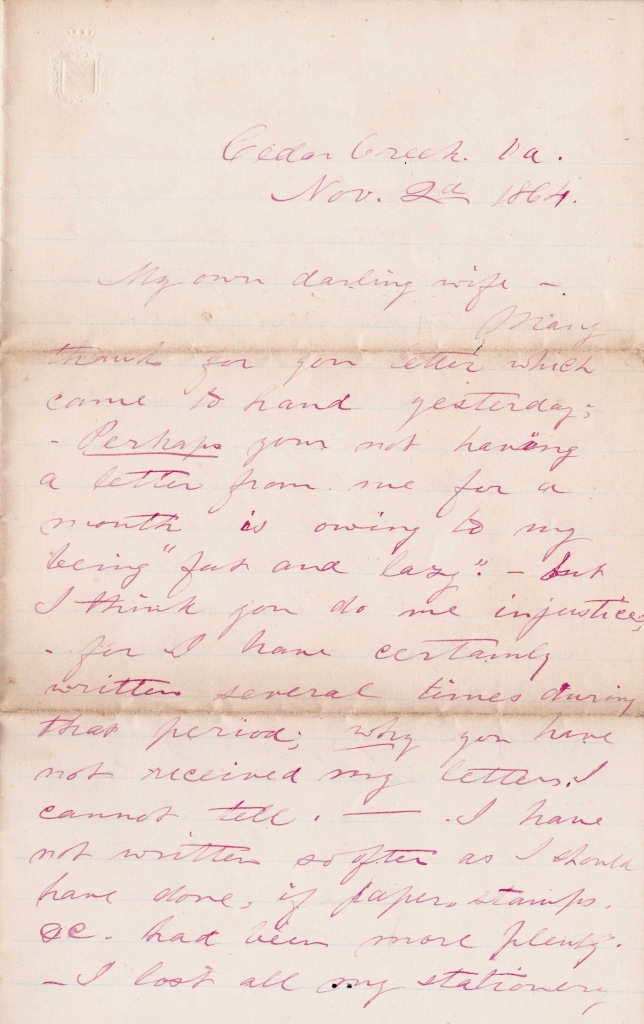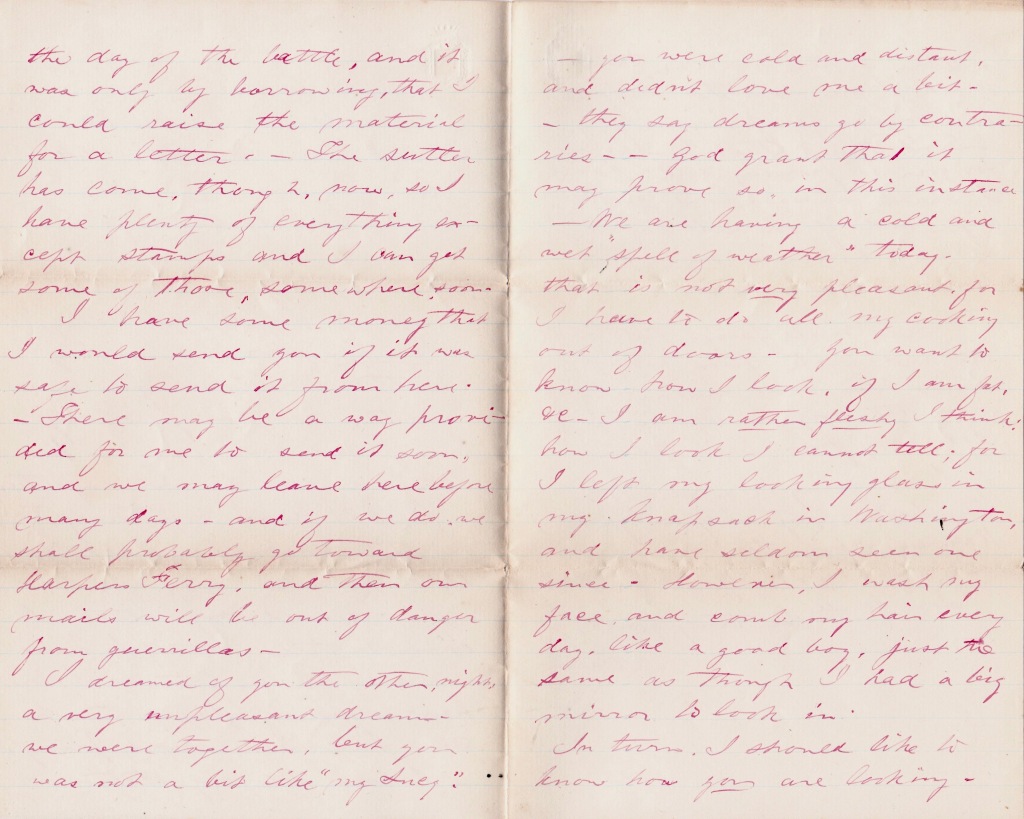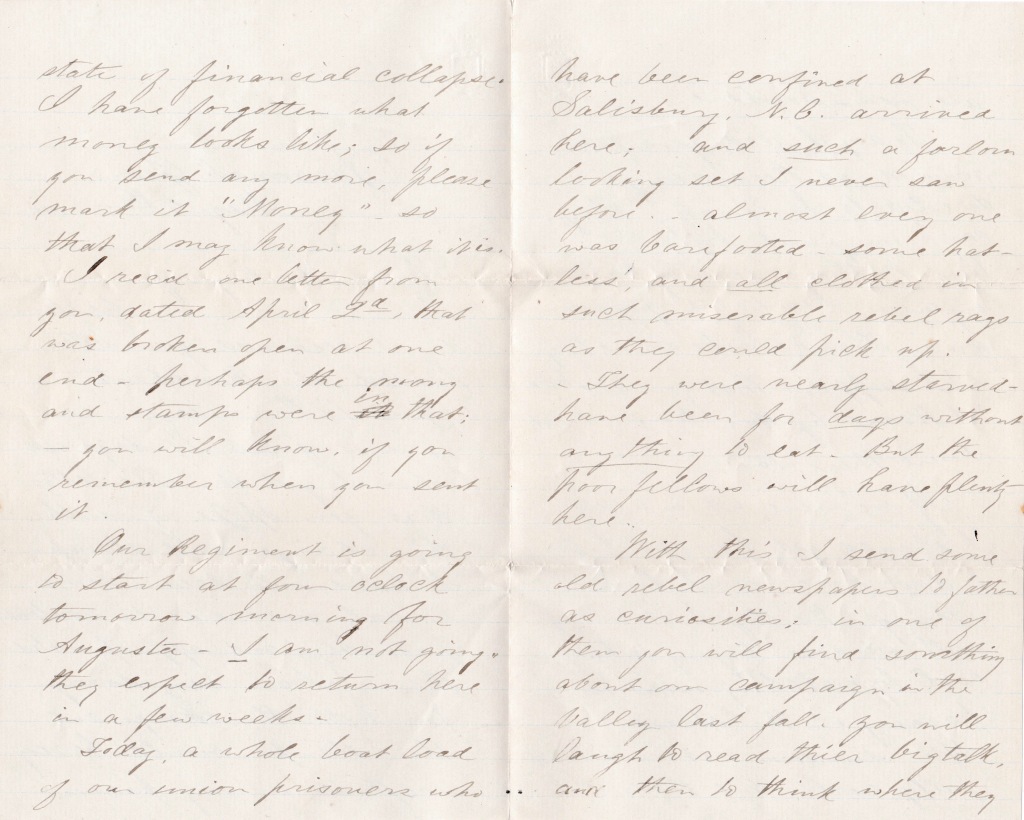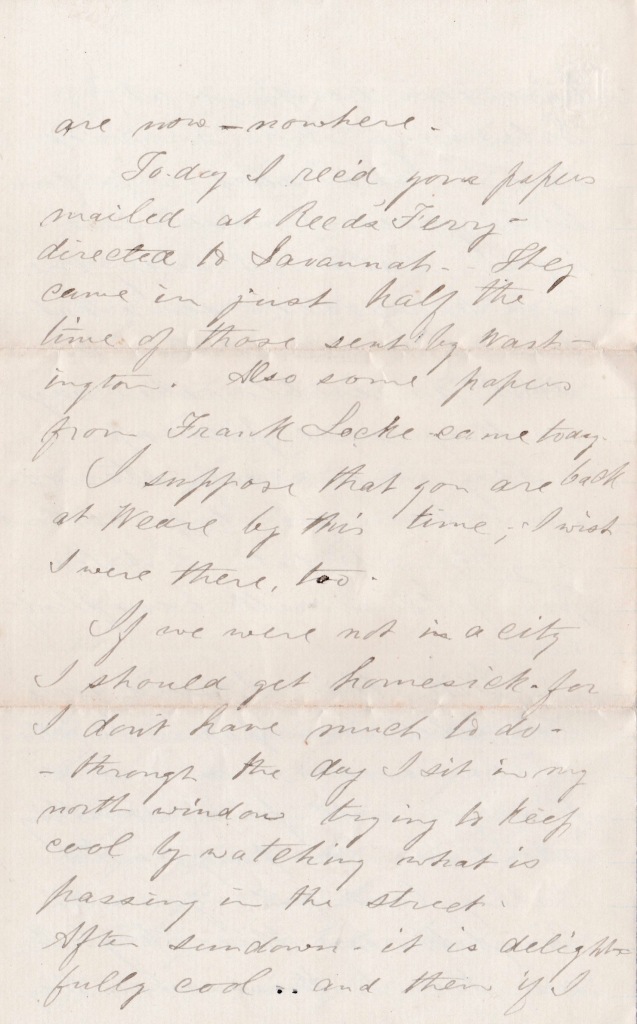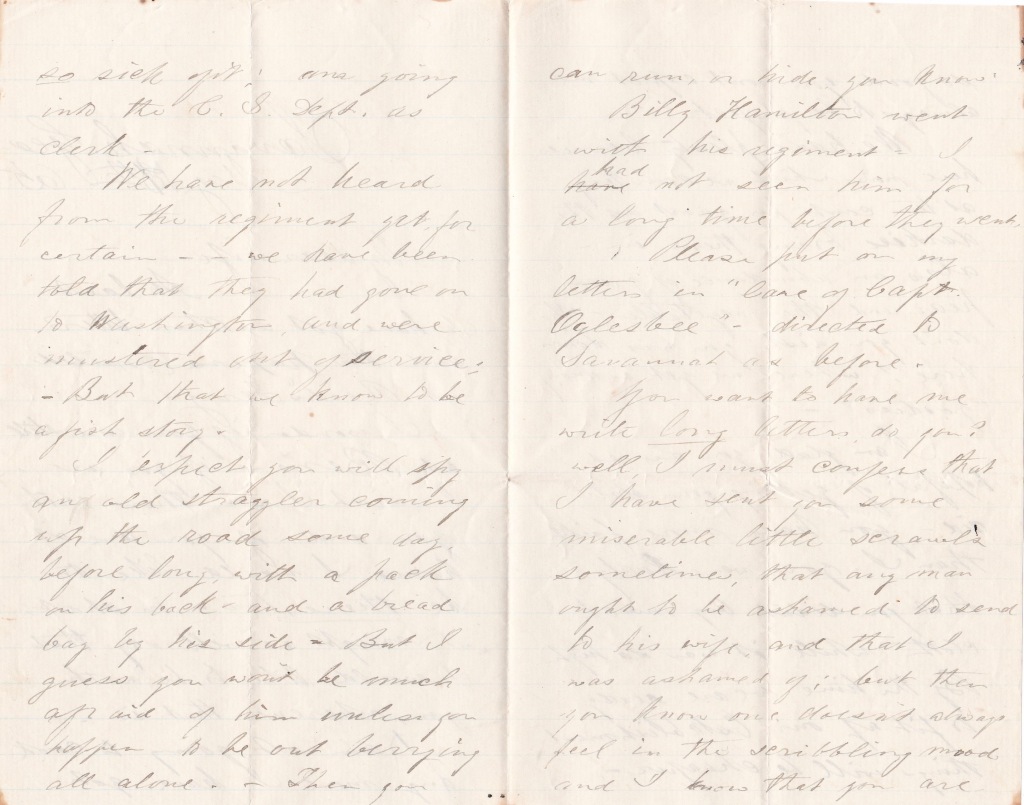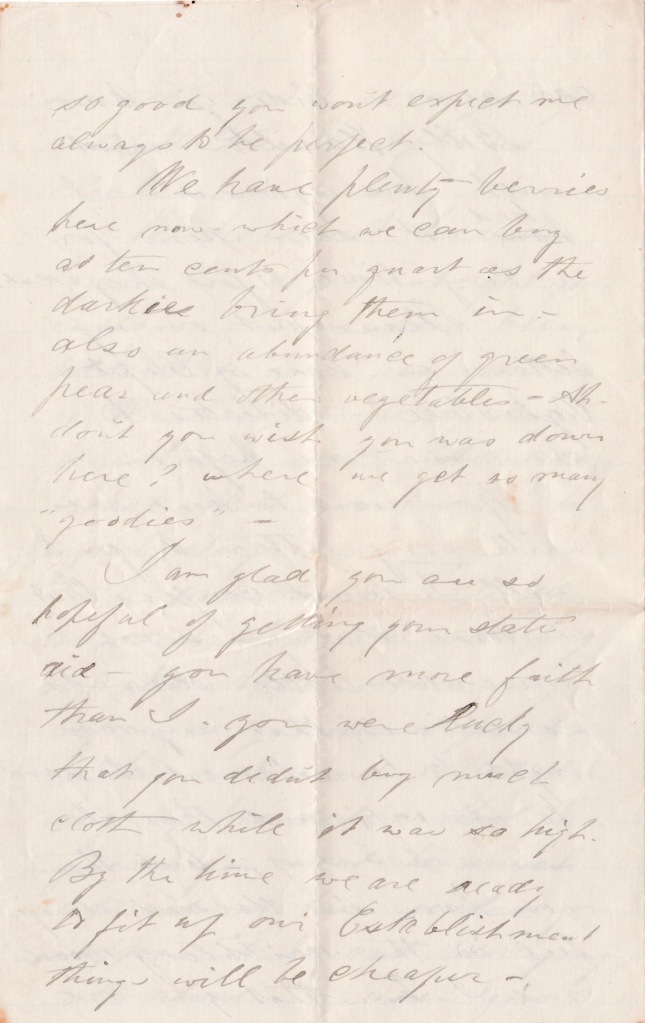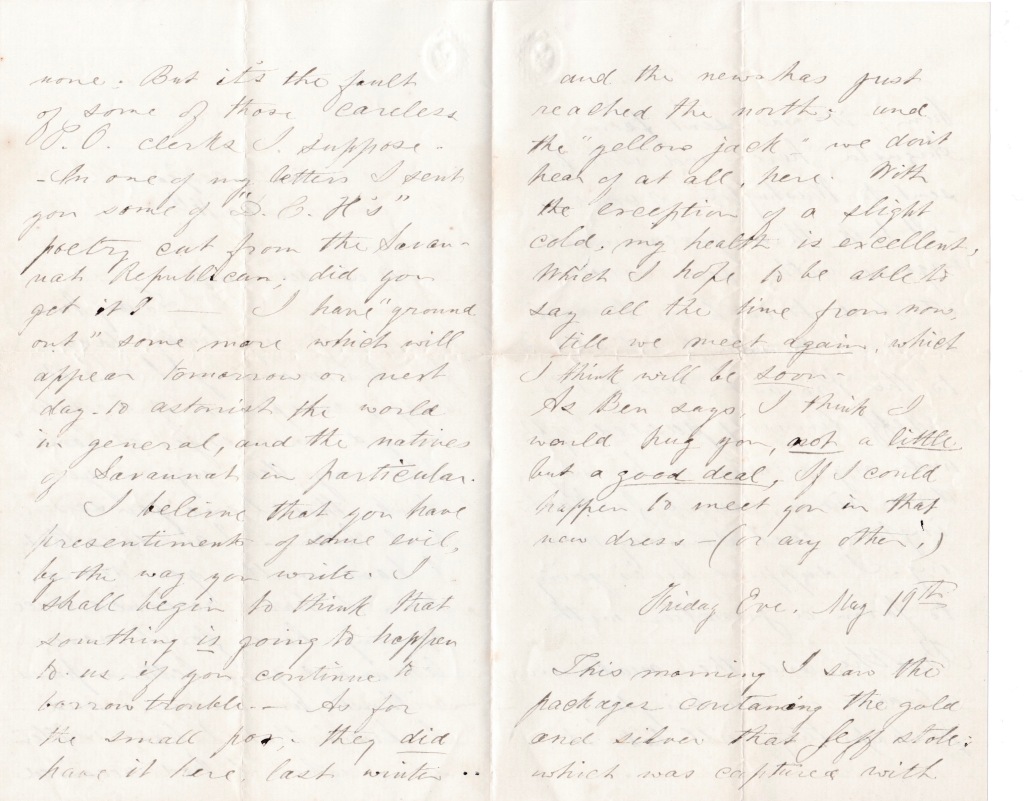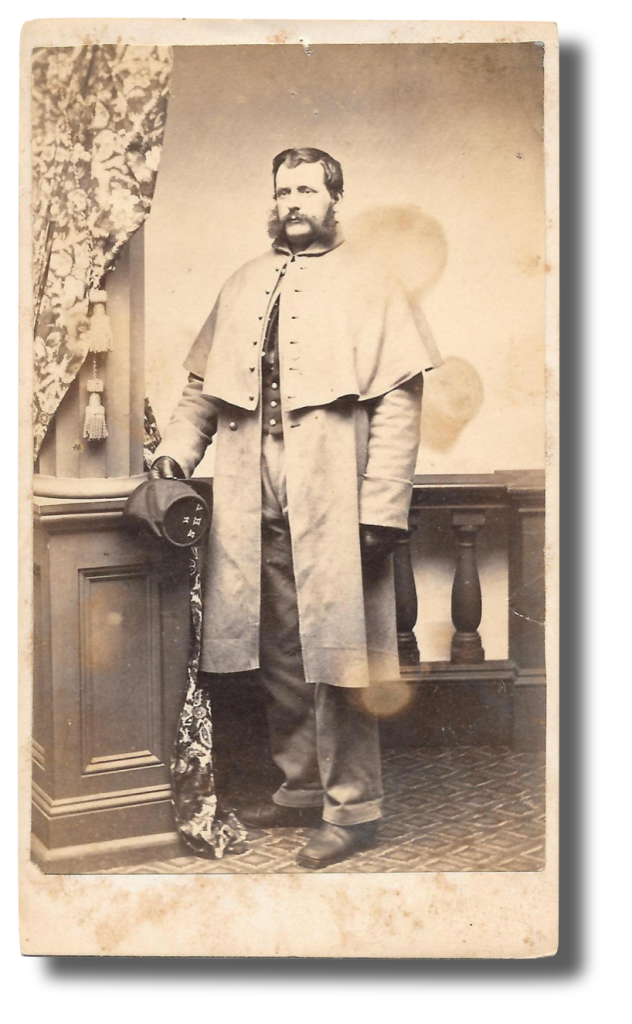
These letters were written by Henry “Calvin” Day (1830-1912), the son of George Day (1806-1889) and Sarah Chase (1811-1891) of Weare, New Hampshire. Henry wrote all of these letters to his first wife, Lucy Hartshorn (1831-1888), the daughter of John and Susan (Thomas) Hartshorn of Merrimack, New Hampshire. The couple were married on 13 September 1862, at Manchester. (He was married a second time in 1890 to Lillie B. Ward.)
Calvin was 31 years old when he enlisted in Co. D, 14th New Hampshire Infantry on 18 August, 1862. This was only four weeks before he married Lucy Hartshorn. Sometime in early 1865 it appears that Calvin was detailed to the commissary subsistence department under Capt. Nathan Oglesbee and he was posted at Savannah late in the war. He mustered out of the service at Savannah on 8 July 1865.
The letters reflect the thoughts of a soldier who clearly misses his wife and is feeling the passage of time keenly. There are also some interesting observations in them as when he sees a group of Union boys who have been released from Salisbury Prison at the end of the war and the passing of Jefferson Davis and his wagons of loot after his capture.
The first letter was written from Camp Grover in 1862. It is stained by some leaves that Calvin says he picked in the woods for his wife but can’t identify. It contains a great hand-drawn sketch of his shanty.
[Note: These letters are from the private collection of Jim Doncaster and are published by express consent.]
Letter 1
Camp Grover, Maryland
[Upper Potomac]
December 14th 1862
My own dear wife,
I believe that I have not written to you for a whole week, but have received two letters from you in the time. The first one containing one dollar and fifty cents. The second one dollar and sixty-five cents.
I did not want you to send me money unless you could get some from the bank, I think that you will need all your wages for spending money so please don’t send anymore. I think that we shall be paid off soon and if we are, I shall not need anymore than I have at present.
I went to be weighed last week and how much do you guess I have gained? When I first enlisted my weight was about one hundred and twenty lbs. Now it is one hundred and thirty-seven. What do you think of that—again of seventeen pounds. Mr. [Otis G.] Cilley says it is all owing to my getting married but I don’t believe that, You know I think that I shall order a new suit of clothes soon as my old ones are getting tight. How is it with you> I am afraid you have lost weight instead of gaining.
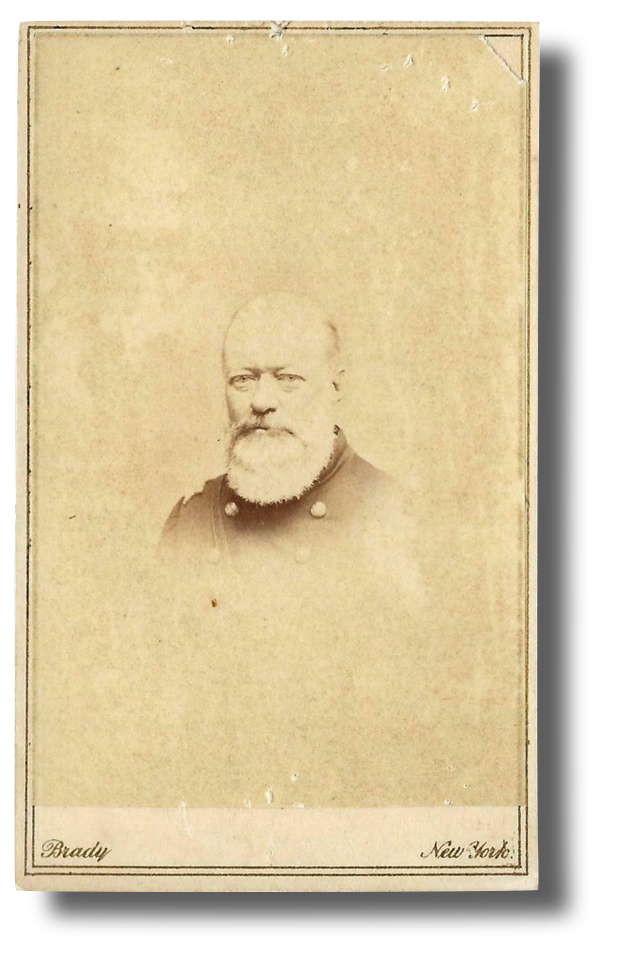
We are having beautiful warm weather. The snow is all gone and it is warm as September at home. There is plenty of mud though, but we don’t care for that. We are rather a loveless set of boys. They say that the New Hampshire 14th beats all the regiments that have been sent from there before. Our old Colonel [Robert Wilson] says that if he could get us within five miles of Richmond, we should steal it in three weeks. There is a church, school house, and burying ground close by. Some of the boys have robbed the church of the sofa, bibles, &c., torn down the school house to get the boards and taken the grave stones to build their chimneys of. Don’t you believe we are tough boys? You need not tell of it as I think such things are too bad to tell of one’s own regiment.
Yesterday there was an apple peddler here who had been drafted but he said he would never fight for the Union army. Our boys didn’t like such talk so they took his barrel of apples, turned them out on the ground and confiscated them. Then they him, put him in the guard house and kept him all day, then let him go. Secesh has to keep pretty still here at present.
If I have time I will make a sketch of our shanty today and sent it in this. I have no good paper so I cannot do it very well. Perhaps it will give you a faint idea of how it looks.
From your loving husband, — Calvin
I send you some green leaves which I picked up in the woods yesterday. I don’t know what it is.
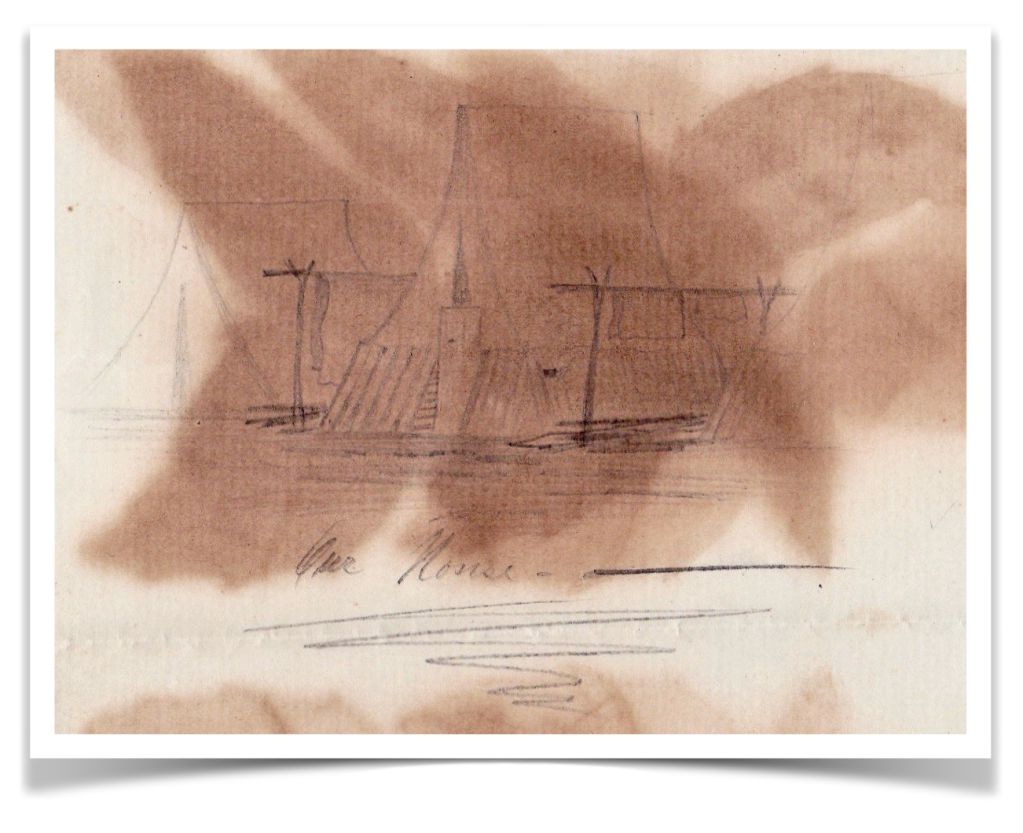
Letter 2
Cedar Creek, Virginia
November 2d 1864
My own darling wife,
Many thanks for your letter which came to hand yesterday. Perhaps your not having a letter from me for a month is owing to my being “fat and lazy.” But I think you do me injustice for I have certainly written several times during that period. Why you have not received my letters, I cannot tell. I have not written so often as I should have done, if paper, stamps, &c. had been more plenty, I lost all my stationery the day of the battle and it was only by borrowing that I could raise the material for a letter.
The sutler has come through now so I have plenty of everything except stamps and I can get some of those somewhere soon. I have some money that I would send you if it was safe to send it from here. There may be a way provided for me to send it soon and we may leave here before many days, and if we do, we shall probably go toward Harpers Ferry and then our mails will be out of danger from guerrillas.
I dreamed of you the other night—a very pleasant dream. We were together but you was not a bit like “my Lucy.” You were cold and distant and didn’t love me a bit. They say dreams go by contraries. God grant that it may prove so in this instance.
We ar having a cold and wet “spell of weather” today. That is not very pleasant for I have to do all my cooking out of doors.
You want to know how I look—if I am fat, &c. I am rather fleshy, I think, HowI look, I cannot tell for I left y looking glass in my knapsack in Washington and have seldom seen one since. However, I wash my face and comb my hair every day like a good boy, just the same as though I had a big mirror to look in.
In turn I should like to know how you are looking—whether better, or worse, than of old. I am sure that I should like to see you for myself. Don’t think that my love for you is growing cold. No, I shall always love my little wife, and if she will only keep up good courage, only a few months longer, we will see happy times yet.
Tell Uncle James that I will try and write him soon. I miss him Oh so much. I am now the only one left in the company from East Weare.
I am going to write to mother too before long. If we go to Harpers ferry, then you can send me a box [but] not before.
Love to all. Ever truly your loving, — Calvin
Letter 3
Savannah, Georgia
May 5, 1865
My own darling wife,
Yesterday I received your letter mailed at Manchester, April 17th, so you see it was just 17 days old when I got it. The letter that you spoke of with the change and stamps I have not seen. Some rascal guessed its contents probably and appropriated them. I am very sorry for both the change and the stamps would be very acceptable in my present state of financial collapse. I have forgotten what money looks like so if you send any more, please mark it “Money” so that I may know what it is.
I received one letter from you dated April 2d that was broken pen at one end. Perhaps the money and stamps were in that. You will know if you remember when you sent it.
Our regiment is going to start at four o’clock tomorrow morning for Augusta. I am not going. They expect to return here in a few weeks.
Today a whole boat load of our union prisoners who have been confined at Salisbury, North Carolina, arrived here, and such a forlorn looking set I never saw before. Almost every one was barefooted, some hatless, and all clothed in such miserable rebel rags as they could pick up. They were nearly starved—have been for days without anything to eat. But the poor fellows will have plenty here.
With this I send some old rebel newspapers to father as curiosities. In one of them you will find something about our campaign in the Valley last fall. You will laugh to read their big talk and then to think where they are now—no where.
Today I received your papers mailed at Reed’s Ferry directed to Savannah. They came in just half the time of those sent by Washington. Also some papers from Frank Locke came today. I suppose that you are back at Weare by this time. I wish I were there too.
If we were not in a city, I should get homesick for I don’t have much to do. Through the day I sit in my north window trying to keep cool by watching what is passing in the street. After sundown it is delightfully cool and then if I [unfinished]
Letter 4
Savannah, Georgia
May 14th 1865
My dear wife,
At last I have got another letter and two papers mailed at Reed’s Ferry.
I wonder if you are still at Ben’s. If you are, I wish I was there with you and if you are at home, I would like to be there too. In short, I might as well say that I would like to be with you wherever that is.
I am not going to cook anymore. I have got so sick of it. Am going into the Commissary Subsistence Dept. as clerk.
We have not heard from the regiment yet for certain. We have been told that they had gone to Washington and were mustered out of service. But that we know to be a fish story.
I expect you will spy and old straggler coming up the road some day before long with a pack on his back and a bread bag by his side. But I guess you won’t be much afraid of him unless you happen to be out berrying all alone. Then you can run or hide you know.
Billy Hamilton went with his regiment. I had not seen him for a long time before they went. Please put on my letters “In care of Capt. [Nathan Haines] Oglesbee” directed to Savannah as before.
You want to have me write long letter, do you? Well I must confess that I have sent you some miserable little scrawls sometimes that any man ought to be ashamed to send to his wife, and that I was ashamed of, but then you know one doesn’t always feel in the scribbling mood and I know that you are so good, you won’t expect me always to be perfect.
We have plenty berries here now which we can buy at ten cents per quart as the darkies bringthem in. Also an abundance of green peas and other vegetables. Ah, don’t you wish you was down here where we get so many goodies?
I am glad you are so hopeful of getting your State aid. You have more faith than I. You were lucky that you didn’t buy much cloth while it was so high. By the time we are ready to fit up our establishment, things will be cheaper.
Letter 5
Savannah, Georgia
May 18th [1865]
My own dear wife,
Today has been one of my lucky days for this morning I was the happy recipient of a “white winged messenger of love” from my dear wife. You think that I owe you several letters. I am sure that I have written you more than I have received since coming here for I never let one of your letters pass without an answer and I know that I have written some when I had received none. But it’s the fault of some of those careless P. O. clerks, I suppose. In one of my letters I sent you some of “D. C. H.’s” poetry cut from the Savannah Republican. Did you get it? I have “ground out” some more which will appear tomorrow or next day to astonish the world in general, and the natives of Savannah in particular.

I believe that you have presentiments of some evil by the way you write. I shall begin to think that something is going to happen to us if you continue to borrow trouble. As for the small pox, they did have it here last winter and the news has just reached the North, and the “yellow jack” we don’t hear of at all here. With the exception of a slight cold, my health is excellent which I hope to be able to say all the time from now till we meet again, which I think will be soon.
As Ben says, I think I would hug you not a little but a good deal. If I could happen to meet you in that new dress (or any other!).
Friday eve, May 19th
This morning I saw the packages containing the gold and silver that Jeff [Davis] stole which was captured with him. It was sent from Augusta here and will be sent to Washington of course. It took three government wagons with four mules attached to each one to haul it from the wharf up street to the Provost Marshal’s. Jeff himself passed right under my window on his way down river, bound for Washington last Sunday morning. I suppose he is going to form a junction with Booth and then make an advance on Washington. Perhaps they will take it.
I don’t expect to be paid off now till we are mustered out of the service and have a final settlement. I should like some money now, however; but if I don’t have it, shall not spend it, I suppose. Don’t send any because it would be very doubtful about my getting it.
I have not heard from Billy Hamilton since the regiment left. I suppose they are still at Augusta. They may be at home and discharged for all that we know to the contrary here. I wonder if any of the New Hampshire troops have got home. What shall I bring you when I come? If I had money I could buy you something pretty. But now what can I do? Oh what a trial poverty is to the Christian graces. Not that I possess any of the latter for if I every had any, I fear that my soldier life has annihilated them. Perhaps you won’t recognize me as the man you promised to love &c. for I think I am not much like myself of three years ago. Whether changed for the better or worse, however, I will leave for you to decide.
I wonder if you have changed too? Have the dark years that have passed since we first met and loved cast their shadows on your brow? If they have, I do not believe they have shadowed your heart as I am sure they have not mine.
Dark and bitter as these years have been, they will help us to appreciate the blessings in store for us as their real value. How few know the value of home and loving friends. I did not when I was in the enjoyment of both. Now of all delights, “home” would to me be the dearest.
Ever thine, — Calvin
To Lucie



